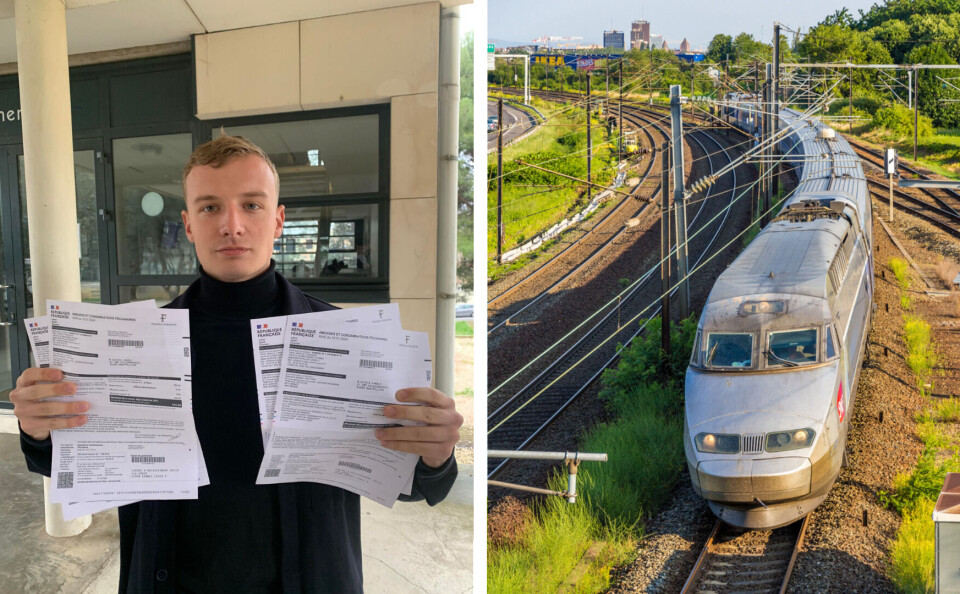-
Red flood alerts continue in south-west - and more heavy rain expected
Garonne river is particularly affected. French weekly weather forecast February 16 - 20
-
Why your car insurance in France is expected to increase this year
Premiums are forecast to rise by four to six percent in 2026
-
Two Britons killed in avalanche in French Alps were with an instructor
French skier also died in the disaster at Val d’Isère on Friday February 13
Student receives €7,000 in train fines after identity theft in France
The 20-year-old said he has to prove he was not on the train in each of the 30 plus cases

A student who has received over €7,000 in fines in the last two years from French rail operator SNCF due to identity theft says he is still being chased for the money - and may be forced to stop studying.
Dentistry student Charly Acosta, 20, told The Connexion the ordeal had taken “a very heavy psychological toll” on him.
He first received a fine on January 19, 2022, although he only found out nine months later after €740 was taken directly from his bank account to pay for an accumulation of fines.
He has received over 30 fines (although they are not sent to him as the scammer gives another address) for not having a ticket on a train despite never being on the train in question.
Each time, he needs to prove that he was not on the named train which leads to him spending long afternoons in the university library printing out copies of his expenses and letters from his university.
Around €1,400 has been taken from his account by the French Treasury and his bank for associated fees.
He says that he still has not received any sort of response from the SNCF, despite trying to contact them many times.
How does the identity scam work?
When he saw the first €740 removed from his bank account, he thought that it was a mistake linked to health insurance or taxes and went to the French Treasury to find out more.
He was then directed to the fines department and discovered that he owed €3,795 to the SNCF for travelling without a ticket on trains, mainly in the Béziers area. The €740 was taken out to begin paying this debt.
A passenger had been racking up fines by using his name, date of birth and an ‘identity card’ featuring his details, and showing it to SNCF guards when questioned for travelling without a ticket. The traveller uses a different address which is why Mr Acosta did not receive the fines himself.
He believes the culprit may be someone he knows as the trips are almost all in the Béziers area where he went to school - but this has not helped him solve the problem.
He says that he has never been on any of the trains he has been accused of taking for free.
At first, the imposter received just two fines, one on the outward journey and one on the return, but has since continued to travel under the false identity, racking up 34 journeys.
A heavy financial and psychological impact
Mr Acosta said it was causing enormous stress and that he “would not wish the ordeal on his worst enemy.”
He is seriously considering ending his studies - he is in his third year at Montpellier - due to money issues. He works in the summers to be able to pay for his studies and has only been able to keep studying thanks to help from his girlfriend.
He is required to contest every fine but has struggled, especially as he sometimes only finds out about them after the three-month limit (that SNCF allows for fine disputes) has passed.
“It is like fighting a ghost,” he said.
Though he should eventually get his money back, the Treasury will not reimburse someone who still owes them money and as the fraud is still ongoing and fines are still coming in, he has not yet been reimbursed.
“In addition, the bank charges a 10% fee for a third-party request for funds like this, so for €740 taken from my account, they charge €74, as well as overdraft fees if I do not have enough money in the account.”
He estimated that it has cost him about €1,400 so far and the identity thief has racked up over €7,000 in fines.
‘Tedious process’
In response to the issue SNCF said: “In the event of identity theft we advise our passengers to contact our Identity Theft department (usurpation@sncf.fr) as soon as possible, providing the complaint, the declaration of loss of identity card, a copy of the identity card and documents certifying that the victim of identity theft was not on the train at the time of the incident.”
The SNCF acknowledged this “is a tedious process”, but it added that it is “essential for our Impersonation Department to be able to start processing a case.”
This is because “unfortunately, we are sometimes confronted with false declarations of identity theft.”
Just before The Connexion interview, Mr Acosta was writing what he described as “yet another email” to the SNCF but he has still not been contacted.
Specialist lawyer Marie-Camille Eck told Le Parisien that SNCF needed to do more to prevent the problem, such as having the false ID sound the alarm on ticket inspectors' scanning tools.
Related articles
What are the rules for validating train tickets in France?
Why it is a good idea to carry ID when travelling on French trains
Musicians in France angry at SNCF rail fines for big instruments
























